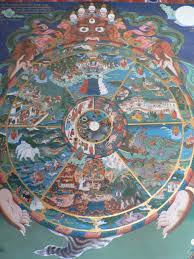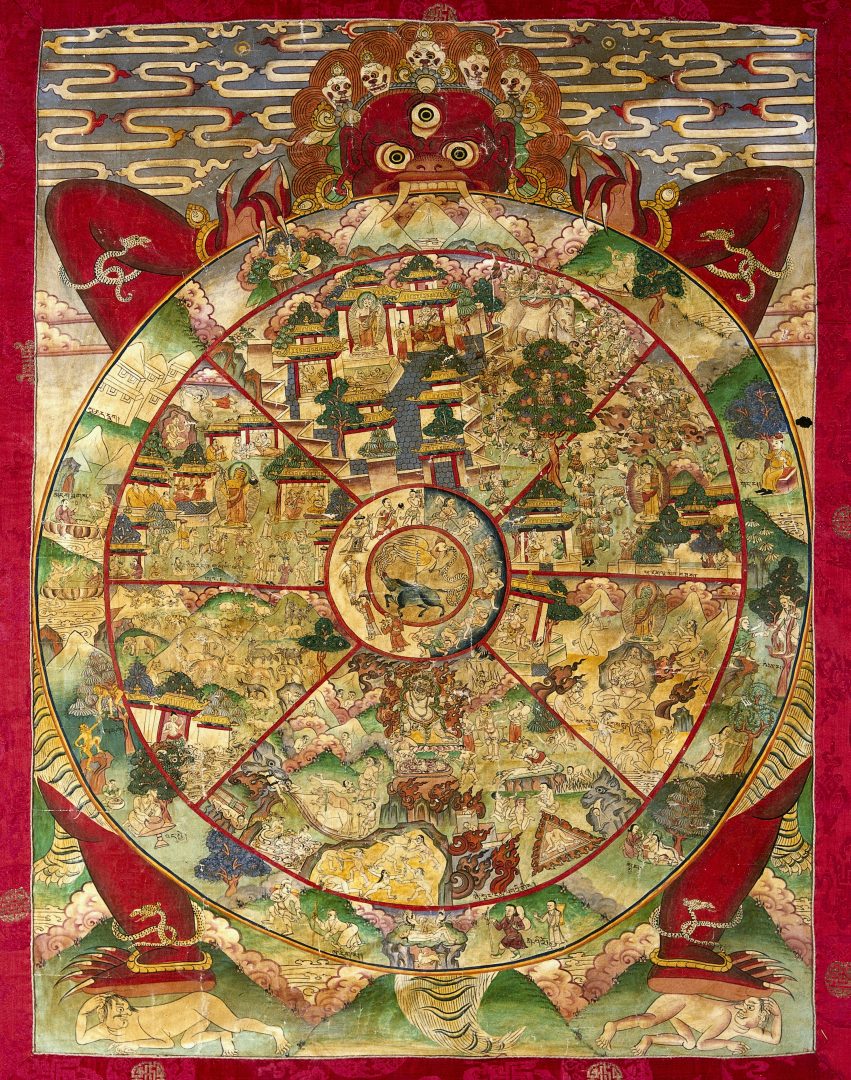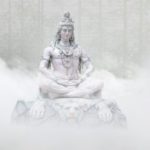What do you consider is the meaning of life? What is your purpose? Why are we here? According to the Vedas our soul (Athma) is bound in a “cycle”, the cycle of life and death. Endlessly the Athma transcends from possessing one form to the next, this is the concept of reincarnation. So the logical inference is that the aim is to break free! Freedom. Freedom from every constraint, this is the aim of life, the aim of all the Hindu teachings.
The word Karma on its own means deeds or actions. Therefore the Law of Karma is the relationship between what you do and the effect this has on your life. People often mistake the Law of Karma as a method only to punish you for your wrongdoings, although this is correct this is only half the story. The Law of Karma does both “reward” and “punish” you for all your deeds, “As all surrender unto Me, I reward them accordingly” (Bhagavad Gita 4.11). This law means to an extent you are the director of your own future, “The living entity in material nature thus follows the ways of life enjoying the three modes of nature thus he meets good and evil amongst various species.” (Bhagavad Gita 13.22)
The Law of Karma is related to the world/Samsara (or sansara, as it is more commonly, is known). The sansara, simply put in the world, or used more broadly it relates to the universe, i.e. all that which is material. So the sansara is the stage where the performance of life takes place. It is taught that work and pleasure do not mix, therefore whilst working/living in this sansara; detach yourself from the pleasures and pains of this world, in order to gain the true bliss of realization.
Concept of reincarnation and sansara
There are two ways the Law of Karma ties in with the concept of reincarnation and sansara. Firstly it states that, “what you sow is what you reap”, and this would become apparent either, immediately following an action (e.g. a bad cook burning himself whilst cooking), sometime during your life (e.g. a student who worked hard achieving good grades, or a murderer being caught 40yrs later) or in another life. Don’t be surprised! Yes, what you do affects the outcome of your next life too.
 Think of your Karma as being imprinted onto your Athma, as you have more experiences and learn new things, the Athma carries this around with itself forever like an account of all your experiences. Based on this, two decisions will be made, firstly what you will reincarnate as and secondly the aspirations you will carry with you in your next life. For example, if you spent your life being glutinous you may reincarnate as a pig in your next life. “The living entity in the world carries his different conceptions of life from one body to another as the air carries aromas. Thus he takes one kind of body and again quits it to take another. The living entity, thus taking another gross body, obtains a certain type of ear, eye, nose, tongue, and sense of touch and the time of death, the consciousness created by the living being carries him to the next body, if the living being has made a consciousness like an animal’s, he is sure to get an animals body.” (Bhagavad Gita 15.8 15.9)
Think of your Karma as being imprinted onto your Athma, as you have more experiences and learn new things, the Athma carries this around with itself forever like an account of all your experiences. Based on this, two decisions will be made, firstly what you will reincarnate as and secondly the aspirations you will carry with you in your next life. For example, if you spent your life being glutinous you may reincarnate as a pig in your next life. “The living entity in the world carries his different conceptions of life from one body to another as the air carries aromas. Thus he takes one kind of body and again quits it to take another. The living entity, thus taking another gross body, obtains a certain type of ear, eye, nose, tongue, and sense of touch and the time of death, the consciousness created by the living being carries him to the next body, if the living being has made a consciousness like an animal’s, he is sure to get an animals body.” (Bhagavad Gita 15.8 15.9)
This works for all living things, i.e. this applies to both animals and plants too. There are countless stories in Hindu mythology about the good actions of animals, leading to them being reincarnated as humans in their next lives. As I said, you also carry your aspirations into your next life. For example, if in this life you began your spiritual journey and began to inquire and gain knowledge about God, in your next life you will be born with this knowledge, and so it will be a case of revising what you know, and moving onto the next step of your journey acting on your knowledge or doing your Karma!
Liberation from the sansara and the attainment of Moksha
Secondly, the Law of Karma is related to liberation from the sansara and the attainment of Moksha. Moksha is liberation from the cycle of life and death, the ultimate freedom. Moksha is attained by the realization of the Athma or the realization and experience of God. In the Gita Lord Krishna says to Arjuna, “Perform your prescribed duty, for doing so is better than not working. One cannot even maintain one’s physical body without work. Work done as a sacrifice for Vishnu has to be performed; otherwise, work causes bondage in this material world. Therefore, O son of Kunti, perform your prescribed duties for His (God’s) satisfaction, and in that way, you will always remain free from bondage” (Bhagavad Gita 3.8 3.9). Once one has reached this stage, all Karma will be like a ritual or offering to God. Eating, sleeping, going to work, cleaning, washing and all the other day-to-day activities of life will be an offering to God and done only for God, without even one infinitesimal amount of selfishness. Once this state is reached, Moksha can be attained!
Everything one thinks everything one speaks and everything one does is linked, and therefore every thought, word, and deed has a consequence. It is only with harmony in all these three, and destruction of the “I” or the EGO, can one perform truly selfless, God gifting Karma and one can attain Moksha from this sansara, and merge with God himself. Become God, realize the truth!






